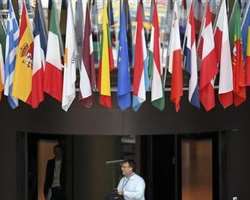Euro Zone Slump Deepens, China Falters

The shadows being cast over the global economy darkened this month as the euro zone's private sector declined further and China's once-booming factories faltered, business surveys showed on Thursday.
Worryingly for European policymakers, a downturn that started in smaller euro zone periphery members is now taking root in the core countries of Germany and France, whose tepid combined growth had been keeping the troubled bloc afloat.
"We are very much in a period of weakening global growth. It doesn't quite feel like 2008 yet but the danger is we could get there quicker than we think," said Peter Dixon at Commerzbank
The data sent German Bund futures to a record high as investors sought relative safety, and the euro fell to a near two-year low against the dollar.
The moves were also exacerbated by Wednesday's news that European Union leaders have been advised by senior officials to prepare contingency plans in case Greece quits the single currency - a once seen unthinkable event.
The euro zone composite PMI, a combination of the services and manufacturing sectors and seen as a guide to growth, fell to 45.9 this month from April's 46.7, its lowest reading since June 2009 and its ninth month below the 50-mark that divides growth from contraction.
"It clearly indicates that the evaporating sentiment that we have seen in recent weeks as the Greece crisis has intensified is having a big impact on the economy," Dixon said.
"The concern has to be if this is happening ahead of the event what is going to happen if, or when, the shoe finally drops and we have something like a Greek exit from the euro zone - it doesn't bode well for the economy and does sound as though it is standing on the brink of something nasty."
Markit, which complies the PMIs, or purchasing managers indexes, said the reading was consistent with gross domestic product, which stagnated in the first quarter, falling by at least 0.5 percent across the region in the current quarter.
"The flash PMI figures for May look horrible and provide a clear warning that euro zone GDP will almost certainly show a contraction in Q2 after stagnating in Q1," said Martin van Vliet at ING.
Across the channel, official data showed Britain's economy shrank more than first thought between January and March, after the deepest fall in construction output in three years, while government spending made the biggest contribution to growth.
Markit will release its first flash PMI for the United States later on Thursday, giving an early indication of the manufacturing sector in the world's biggest economy.
The U.S. spring home-selling season got off to a strong start in April, with rising sales and prices providing evidence that a housing market recovery was gaining some traction, but a rise in inflation over the past year suggests the Federal Reserve has little firepower left to boost employment.
CORE CRUMBLES
PMI data from Germany, Europe's largest economy, showed its manufacturing sector contracted at a far greater pace than was expected, and its service sector saw minimal growth. In neighboring France, both sectors contracted faster than predicted by most economists.
German business sentiment also dropped for the first time in seven months in May, the Ifo think tank said, missing even the most conservative forecasts, in a sign that Europe's largest economy is vulnerable to euro zone turmoil despite holding up well until now.
Germany's economy has powered ahead of its peers after recovering swiftly from the 2008/09 financial crisis and has consistently brushed off debt worries plaguing peripheral euro zone countries and spreading through the bloc.
It grew 0.5 percent in the first quarter, data confirmed on Thursday, but a drop in inventories gave a warning signal for growth in the coming quarters, reflecting weakening new orders.
"There is a clear risk for a perceptible economic slowdown in Germany. The strong growth seen at the start of the year could not be maintained. There will be an awful lot of uncertainty out there about what's going to happen next in the run-up to the Greek election," said Andreas Scheuerle at DekaBank.
The prospect of a Greek exit from the euro zone is now being openly discussed as the country battles political and economic upheaval and faces an election on June 17.
Two separate recent Reuters polls of money market traders and economists both saw a slim majority saying Greece would still be a member of the 17-nation bloc at the end of the end of 2013.
A summit of the G8 leading industrialized nations at the weekend backed keeping Greece in the euro zone and the EU leaders have urged Athens to stay the course on austerity and complete reforms demanded under its bailout program.
CHINA BRAKES
HSBC's Flash China PMI, the earliest indicator of China's industrial sector, retreated to 48.7 in May from a final reading of 49.3 in April. It marked the seventh straight month that the index has been below 50.
The figures signal that the sluggish economic conditions of the first quarter are set to continue throughout the first half of the year in China's longest slowdown since the global financial crisis.
"The series of highly disappointing April activity data - exports, imports, industrial production and retail sales indicators all fell short of even the most pessimistic forecasts - the first gauge for economic activity in the current month is a further signal that internal and external headwinds are still biting into economic momentum," said Nikolaus Keis at UniCredit.
The HSBC PMI has provided a contrast to the Chinese government's official PMI. The government PMI hit a 13-month high of 53.3 in April as exports ticked higher although domestic orders showed signs of weakness.
That survey includes more state-owned firms in its results, while the HSBC PMI captures more private firms, which have a more restricted access to credit. The two surveys also have differing methodologies for seasonal adjustment.
REUTERS
